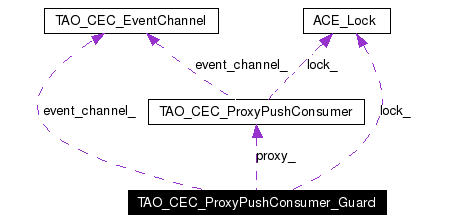
#include <CEC_ProxyPushConsumer.h>
Collaboration diagram for TAO_CEC_ProxyPushConsumer_Guard:

Public Member Functions | |
| TAO_CEC_ProxyPushConsumer_Guard (ACE_Lock *lock, CORBA::ULong &refcount, TAO_CEC_EventChannel *ec, TAO_CEC_ProxyPushConsumer *proxy) | |
| Constructor. | |
| ~TAO_CEC_ProxyPushConsumer_Guard (void) | |
| Destructor. | |
| bool | locked (void) const |
| Returns true if the reference count successfully acquired. | |
Private Attributes | |
| ACE_Lock * | lock_ |
| The lock used to protect the reference count. | |
| CORBA::ULong & | refcount_ |
| The reference count. | |
| TAO_CEC_EventChannel * | event_channel_ |
| The event channel used to destroy the proxy. | |
| TAO_CEC_ProxyPushConsumer * | proxy_ |
| The proxy whose lifetime is controlled by the reference count. | |
| bool | locked_ |
This is a helper class used in the implementation of ProxyPushConumer. It provides a Guard mechanism to increment the reference count on the proxy, eliminating the need to hold mutexes during long operations.
Definition at line 157 of file CEC_ProxyPushConsumer.h.
|
||||||||||||||||||||
|
Constructor.
Definition at line 319 of file CEC_ProxyPushConsumer.cpp. References TAO_CEC_ProxyPushConsumer::is_connected_i(), and locked_.
00323 : lock_ (lock), 00324 refcount_ (refcount), 00325 event_channel_ (ec), 00326 proxy_ (proxy), 00327 locked_ (false) 00328 { 00329 ACE_Guard<ACE_Lock> ace_mon (*this->lock_); 00330 // If the guard fails there is not much we can do, raising an 00331 // exception is wrong, the client has *no* way to handle that kind 00332 // of error. Even worse, there is no exception to raise in that 00333 // case. 00334 // @@ Returning something won't work either, the error should be 00335 // logged though! 00336 00337 if (!proxy->is_connected_i ()) 00338 return; 00339 00340 this->locked_ = true; 00341 ++this->refcount_; 00342 } |
|
|
Destructor.
Definition at line 345 of file CEC_ProxyPushConsumer.cpp. References TAO_CEC_EventChannel::destroy_proxy(), and locked_.
00346 {
00347 // This access is safe because guard objects are created on the
00348 // stack, only one thread has access to them
00349 if (!this->locked_)
00350 return;
00351
00352 {
00353 ACE_Guard<ACE_Lock> ace_mon (*this->lock_);
00354 // If the guard fails there is not much we can do, raising an
00355 // exception is wrong, the client has *no* way to handle that kind
00356 // of error. Even worse, there is no exception to raise in that
00357 // case.
00358 // @@ Returning something won't work either, the error should be
00359 // logged though!
00360
00361 --this->refcount_;
00362 if (this->refcount_ != 0)
00363 return;
00364 }
00365 this->event_channel_->destroy_proxy (this->proxy_);
00366 }
|
|
|
Returns true if the reference count successfully acquired.
Definition at line 45 of file CEC_ProxyPushConsumer.i. References locked_.
00046 {
00047 return this->locked_;
00048 }
|
|
|
The event channel used to destroy the proxy.
Definition at line 180 of file CEC_ProxyPushConsumer.h. |
|
|
The lock used to protect the reference count.
Definition at line 174 of file CEC_ProxyPushConsumer.h. |
|
|
This flag is set to true if the reference count was successfully acquired. Definition at line 187 of file CEC_ProxyPushConsumer.h. Referenced by locked(), TAO_CEC_ProxyPushConsumer_Guard(), and ~TAO_CEC_ProxyPushConsumer_Guard(). |
|
|
The proxy whose lifetime is controlled by the reference count.
Definition at line 183 of file CEC_ProxyPushConsumer.h. |
|
|
The reference count.
Definition at line 177 of file CEC_ProxyPushConsumer.h. |
 1.3.6
1.3.6